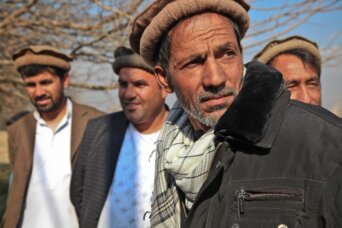- About
- Topics
- Picks
- Audio
- Story
- In-Depth
- Opinion
- News
- Donate
-
Signup for our newsletterOur Editors' Best Picks.Send
Read, Debate: Engage.
| topic: | Peace and Reconciliation |
|---|---|
| located: | Afghanistan |
| editor: | Shadi Khan Saif |
The institutionalised representation of millions of Afghan workers in the public and private sectors remain hostage to bitter squandering between the government and pressure groups.
It has been over three decades since the workers’ union, National Union of Afghanistan Workers and Employees (NUAWE), with all its shortcomings, represented labourers in this war-torn and aid-defended country. The NUWAE accumulated reasonable political strength and fortune during the pro-communist regime in Kabul during the 1970s and 1980s but was soon monopolised by political and pressure groups during and after the civil war in the 1990s.
Ever since, with the country plunging into deeper economic and political crises, the poor labourers in the little remaining public and private sector jobs have been on a knife-edge.
The fall of the hardline Taliban regime in early 2001 and the installation of a western-backed democratic system has so far failed to move away from charity to welfare of workers or reform the left-overs of the NUAWE. Workers in mining, newly established industries and particularly in the public sector, remain under the mercy of ad-hoc policies.
The country’s well-versed president Ashraf Ghani, a former World Bank economist, knows very well the details and depth of poverty his country faces but has somehow not demonstrated the actions for the institutionalised welfare, skill-building or workers and respect for trade unions as a social partner.
Resolution of the stalemate between the Afghan government and NUAWE is the need of the hour, as only the poor are suffering while those in power on both sides seem unmoved.
The International Trade Union Confederation (ITUC), representing 200 million workers in 163 countries, last month warned the Afghan president via a letter that a lack of respect for trade unions as a social partner and for internationally recognised labour standards is detrimental to the international cooperation that is all the more needed by the working people in Afghanistan, devastated by the Covid-19 pandemic.
It urged the government of Afghanistan to restore the normal functioning of NUAWE. However, it must be reformed and made worker-centric rather than serving the benefits of a few at the top level.
As per Ghani’s own words, the state alone cannot lift people out of poverty or provide jobs and opportunities for the 400,000 people who are entering the labour market each year but requires the culmination of freedoms, laws, institutions, and values.
So, as the Ghani administration is in dialogue with a range of major international firms on investments in transmission lines, mining and other fields, it should ensure the NUAWE is reformed and enabled to defend the right of Afghan workers.
Image by Amber Clay

